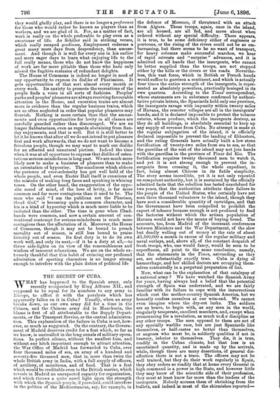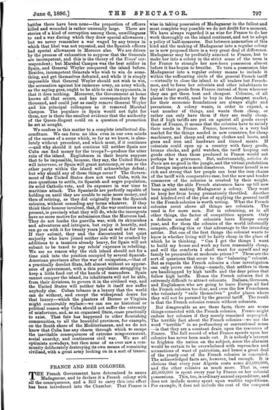THE SECRET OF CUBA.
WHAT has happened to the Spanish army, only recently reorganised by King Alfonso XII., and supposed to be equal for its numbers to any army in Europe, to afflict it with the paralysis which has apparently fallen on it in Cuba ? Usually, when an army breaks down, as our own army did for a time in the Crimea, and the Chinese army did in Manchuria, the blame is first of all attributable to the Supply Depart- ments, or the Transport Service, or the central administra- tion. This explanation of the failure in Cuba is not, how- ever, so much as suggested. On the contrary, the Govern- ment of Madrid deserves credit for a feat which, so far as we know, is unrivalled in the long annals of military opera- tions. In perfect silence, without the smallest fuss, and without any hitch important enough to attract attention, the War Office of Madrid has forwarded to Cuba, over four thousand miles of sea, an army of a hundred and seventy-five thousand men, that is, more than twice the whole British army in India, with a full supply of officers, of artillery, of munitions, and of food. That is a feat -which would be creditable even to the British marine, which reveals in Madrid an unexpected capacity for organisation, and which throws a quite novel light upon the strength with which the Spanish people, if provoked, could interfere in the politics of the Mediterranean, say, for example, in the defence of Morocco, if threatened with an attack from Algiers. These troops, again, once in the island, are all housed, are all fed, and move about when ordered without any special difficulty. There appears, it is true, to be some deficiency either of engineers or pontoons, or the rising of the rivers could not be so em- barrassing, but there seems to be no want of transport, for heavy columns make successful marches, we hear of rapid retreats and " surprise " advances, and it is admitted on all hands that the insurgents, who cannot be better supplied than the troops, are not stopped either by the hills or the rivers or the roads. Neverthe- less, this vast force, which in British or French hands would suffice to garrison a continent, and which is actually four times the entire strength of the insurgents, is repre- sented as absolutely powerless, practically besieged in its own quarters. According to the Times' correspondent, whose statements are in substance confirmed by authori- tative private letters, the Spaniards hold only one province, the insurgents ravage with impunity within twenty miles of Havana, the remoter villages are all in the insurgents' hands, and it is declared impossible to protect the tobacco estates, whose produce, which the insurgents destroy, as they do all buildings, is absolutely essential to keep up any supply of revenue from Cuba. No attempt is made at the regular subjugation of the island, it is officially declared impossible to prevent the landing of filibusters, and the ruling Generals have actually built a low stone fortification of twenty-two miles from sea to sea, so that the guerillas of the rest of the island may not join hands with the guerillas in the province of Pinar del Rio. The fortification requires twenty thousand men to watch it, and yet it is not strong enough to prevent the in- surgents from crossing it, the whole expedient, in fact, being almost Chinese in its futile simplicity. The story seems incredible, yet it is not only repeated on competent authority, but it is sustained by the officially admitted facts that the rebellion has lasted unsubdued for two years, that the authorities attribute their failure to the people of the United States, who certainly have not sent three thousand volunteers to the island, though they have sent a considerable quantity of cartridges, and that the Government have been compelled to prohibit the export of tobacco because enough is not produced to feed the factories without which the artisan population of Havana would not have the means of buying bread. The accounts, too, from Madrid of the incessant conferences between Ministers and the War Department, of the slow but deadly welling out of money at the rate of about £1,500,000 a month in excess of the regular military and naval outlays, and, above all, of the constant despatch of fresh troops, who, one would fancy, would be seen to be superfluous, all point to the same conclusion, namely, that the statements in the Times, astounding as they are, are substantially exactly true. Cuba is dying of haemorrhage, and her skilled doctors are occupying them- selves contentedly in a perpetual preparation of lint.
Now, what can be the explanation of that catalepsy of a national army ? We have watched the Spanish Army for years, having always had a belief that the potential strength of Spain was underrated, and we are fairly familiar with its failure to cope with the insurrections which cost the mother-country Spanish America, but we honestly confess ourselves at our wits-end. We cannot even imagine where the dry-rot lurks. The soldiers are as brave, to begin with, as any men in the world, singularly temperate, excellent marchers, and, except when pronouncing for a revolution, as much utd3r discipline as any other troops. The men opposed to them are not of any specially warlike race, but are just Spaniards like themselves, or half-castes no better than themselves, or negroes who must be, in soldierly qualities if not in bravery, inferior to themselves. They die, it is true, readily in the Cuban climate, but that loss is an ascertained quantity, and is made up by the arrivals, while, though there are many desertions, of general dis- affection there is not a trace. The officers may not be well trained, but they do their work regularly in Spain, they obey orders so readily that at home every General in high command is a power in the State, and however little they may know of the scientific side of their profession, they must at least know far more than the leaders of the insurgents. Nobody accuses them of shrinking from the bullets, and indeed in most of the skirmishes reported- battles there have been none—the proportion of officers killed and wounded is rather unusually large. There are stories of a kind of corruption among them, unwillingness to end a war during which they draw special allowances ; but we never remember a war waged by any troops in which that libel was not repeated, and the Spanish officers had special allowances in Morocco also. We are driven by the process of exhaustion to suppose that the Generals are incompetent, and this is the theory of the Times' cor- respondent; but Marshal Campos was the best soldier in Spain, and General Weyler conquered the island before. Besides, incompetent Generals who wish to win do some- thing, and get themselves defeated, and while it is simply impossible that General Weyler should not wish to win, the accusation against his immense army, an army which, as the saying goes, ought to be able to eat its opponents, is that it does nothing. Moreover, the Government at home knows all that occurs, and has correspondents by the thousand, and could just as easily remove General Weyler and his principal colleagues as it removed Marshal Campos. The populace in Spain would not fight for them, nor is there the smallest evidence that the authority of the Queen-Regent could on a question of promotion be set at nought.
We confess in this matter to a complete intellectual dis- comfiture. We can form no idea even in our own minds of the causes of a scene which, so far as we know, is abso- lutely without precedent, and which must, if it continues —and why should it not continue till neither Spain nor Cuba can find money for the troops ?—produce the utter ruin of the island. Englishmen in their hearts suppose that to be impossible, because, they say, the United States will intervene, or Spain will grant autonomy, or one or the other party within the island will acknowledge defeat ; but why should any of those things occur ? The Govern- ment of the United States does not want Cuba, with its race questions to settle, its Spanish and negro population, its solid Catholic vote, and its exposure in war time to maritime attack. The Spaniards are perfectly capable of holding on until they are unable to raise more money, and then of retiring, as they did originally from the Spanish colonies, without conceding any terms whatever. If they think their honour involved, that, if the war continues as at present, is precisely what they will do, while the insurgents have no more motive for submission than the Maroons had. They do not loathe the guerilla war, with its skirmishes and adventures and intrigues, but enjoy it heartily, and can go on with it for twenty years just as well as for two. If they submit, they and the discontented but quiet majority who have joined neither side will be crushed by additions to a taxation already heavy, for Spain will not submit to be taxed to pay rebels' expenses in rebelling. We see no reason why the rich island should not for a time sink into the position occupied by several Spanish- American provinces after the war of occupation,—that of a practically derelict State, left almost without an appear- ance of government, with a thin population struggling to keep a little food out of the hands of marauders. Spain cannot conquer the island, its inhabitants will not be able, from their divisions, to govern it in the civilised way, and the United States will neither take it itself nor suffer anybody else. Cuban tobacco is a luxury that the world can do without, and except the widespread desire for that luxury—which the planters of Borneo or Virginia might conceivably replace—we can see no historical or political reason why Cuba should not suffer the extremity of misfortune, and, as an organised State, cease practically to exist. That fate has happened to other flourishing communities, to all the beautiful provinces, for example, on the South shore of the Mediterranean, and we do not know that Cuba has any charm through which to escape the inevitable consequences of extreme misgovernment, social anarchy, and continuous civil war. We are all optimists nowadays, but then none of us ever saw a com- munity deliberately destroying its own means of remaining civilised, with a great army looking on in a sort of trance.







































 Previous page
Previous page